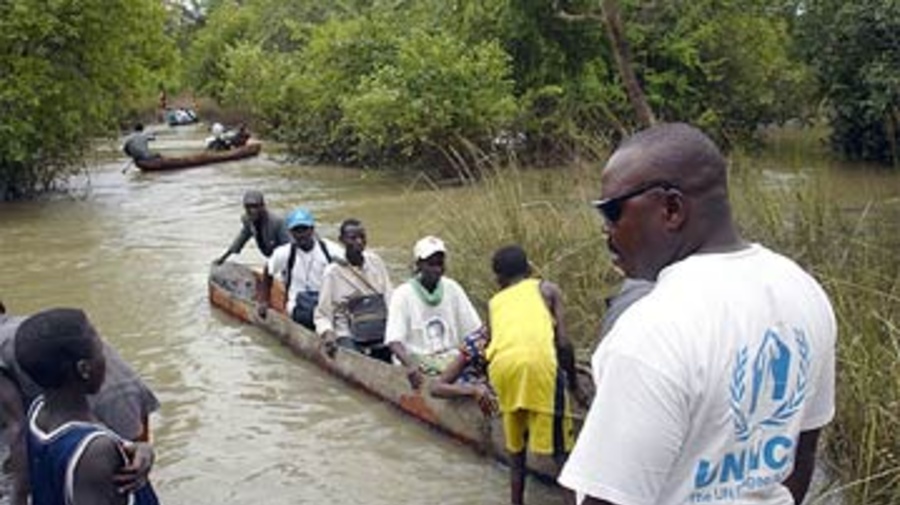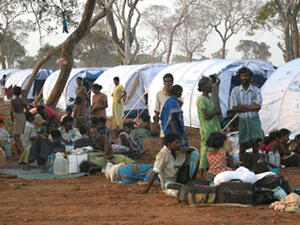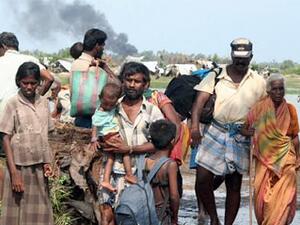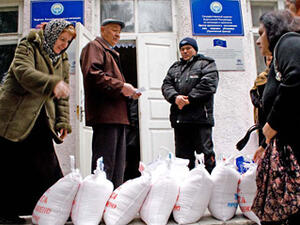Canoe evacuation starts in southern Chad
Canoe evacuation starts in southern Chad

UNHCR and other aid agency staff crossing the swollen Nya River to meet the refugees marooned in Bekan, southern Chad.
BEDOUMIA, Chad, September 16 (UNHCR) - The first of some 2,000 Central African Republic refugees stranded by floods in southern Chad were today successfully evacuated to a camp on dry land after a strenuous journey by foot, canoe and truck, the UN refugee agency said on Friday.
By early afternoon, the first group of 103 refugees had escaped from the Bekan area, in southern Chad, where they have been living in very precarious conditions since being cut off by torrential rain and flooding last month and had been transported to the UNHCR camp in Amboko.
The refugees had to walk 17 km before reaching the banks of the flooded Nya River, where seven six-seat canoes acquired by UNHCR were waiting to ferry them to the other side. There, they boarded trucks which took them along a 25-km stretch of very rough track via the village of Bedoumia to the camp.
Repairs were completed on a damaged bridge near Bedoumia the day before the operation began.
In Amboko Camp, which is already housing 23,000 refugees who have fled insecurity in the Central African Republic (CAR), the new arrivals received a warm welcome, and were visibly delighted to have finally reached a dry, well-provisioned sanctuary. "They were all smiles," said one UNHCR official who accompanied them on the journey from the river. "It was a big contrast to the morning when they looked very tense."
The marooned refugees had been living in the forest near Bekan for the past three to four weeks, surviving for the most part on roots and wild fruit. Local residents had also been providing them with some food, although they do not have much to share.
"We're tired of looking for food," said Dekar Dan, after climbing off one of the trucks with her children. "It was getting more and more difficult. Our children were getting sick and we're looking forward to being in a refugee camp."
"It has been a difficult trek," said her 13-year-old daughter Florence, who was carrying a baby brother or sister in her arms. "There were a lot of incidents in my village where people were beaten by armed groups and cattle breeders. Our possessions were stolen, and that is why my mother decided to bring the family to Chad."
UNHCR staff had travelled to Bekan on Wednesday, by means of canoes and motorcycles, in order to register the refugees and provide them with food for the journey. The relocation movement has been organized by UNHCR together with its partners, which include CNAR (Commission Nationale d'Accueil et de Réinsertion des Réfugiés - Chad's national refugee authority), IFRC, the Chadian Red Cross, COOPI, African Concern, and Care International.
UNHCR officials said they hoped that from now on, after a successful start to the operation, an average of 200 to 300 people will be moved every day to the camp, so the relocation operation should be completed within a week to ten days. A second group was believed to be approaching the river late Friday, ready to cross over the following morning.
"The refugees have already been through a lot - fearing for their lives - before leaving their country and fleeing to Chad." says George Menze, head of the UNHCR office in Goré, the main town in southern Chad. "Now, after finally managing to establish contact with them, we are really glad to be able to bring them to a safe and secure place in Amboko camp."
The refugees left CAR with very few possessions - the odd blanket or mat and a few basic cooking utensils.
According to Madji Julien, a father of five, many people had been hurt during the raids on their villages.
"My cattle were stolen, and I prefer to go to a refugee camp," said the 50-year-old widower. "As long as there is no safety in the northern part of the Central African Republic, I will stay here with my children."
While in Bekan, the refugees were visited by an NGO medical team from COOPI who assessed that most of them are in poor health. Each group of evacuated refugees will undergo further medical screening upon arrival in Amboko camp.
With Amboko camp close to its capacity, the new arrivals will be staying in the camp's school until they can be moved to a new camp the UN refugee agency and its partners are preparing at Bedamara, 10 km from Amboko. A UNHCR site planner is scheduled to arrive at Bedamara in the next few days to oversee development of the new site.
Amboko camp will soon reach its maximum capacity of 27,000. Altogether, up to 45,000 refugees from CAR are in southern Chad. Chad is also hosting 200,000 refugees from Darfur in the east of the country.
By Ginette Le Breton in Bedoumia, Chad
with Hélène Caux in Geneva









